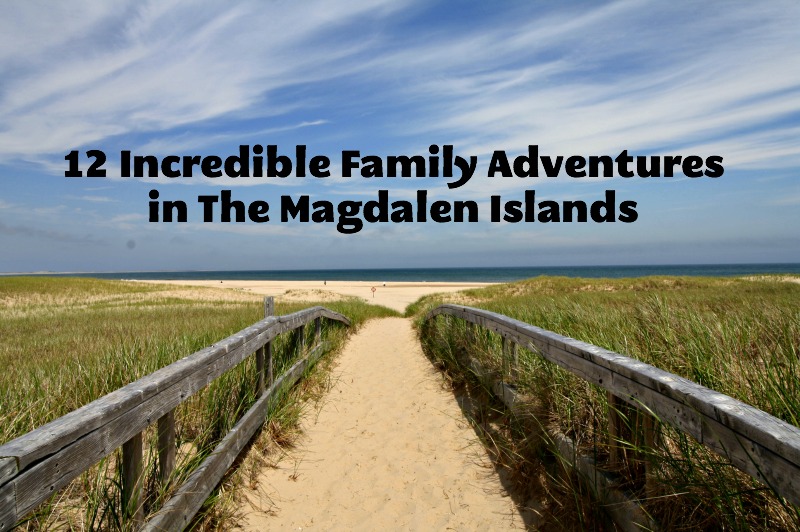
The boardwalk to Old Harry Beach/Photo: Helen Earley
“The Maggies!?” squeals my neighbour when I tell her about a possible destination for our family road trip, “Oh my gosh, you have to go.” She pulls out her honeymoon album and continues gushing: “Helen, the beaches are beautiful, the cheese is amazing, there’s a great brewery, we cycled the whole time and did some windsurfing and camping too, and on the last night, we stayed in an old Convent. It was soooo romantic.” The album flips to a picture of my neighbour returning from dinner at Domaine Du Vieux Couvent, dressed to the nines, looking younger, happier (and tipsier) than I have ever known her.
The Magdalen Islands are a small group of islands in the middle of the Gulf of St. Lawrence, governed by Quebec, but actually closer to the provinces of Prince Edward Island and Nova Scotia. On a clear day, their silhouette can be seen from Cape Breton’s skyline trail. Their sparse fauna – daisies, clover and lupines – leads to a variety of coastal landscapes including steep red cliffs, pebbled beaches, or expanses of wide white sand, as soft and beautiful as any that you’d find in the Caribbean.
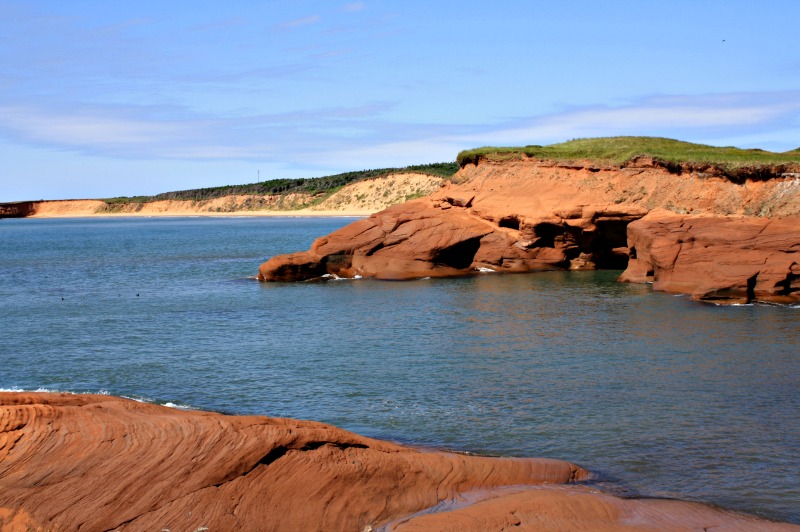
Red cliffs and white sand on Grosse-Île./Photo: Helen Earley
There are no skyscrapers here, but a few low buildings, plenty of churches and a feast of colourful, much-photographed wooden houses with wide verandas and dormer windows, many of which are available for rent as holiday homes. With a land mass of about 205 square kilometres (that’s over 200 times smaller than Nova Scotia!), only one single main highway, and a strong, warm summer wind, “The Maggies” are popular with cyclists, windsurfers and kite-surfers. The Magdalen Islands are also famous for their lively Acadian music scene and delicious food: local cheeses, smoked fish and micro-brewed beer.
But if the islands are perfect for cyclists, cheese-lovers and honeymooners, then what was I going to do there with my two young kids?
When we visited in late July, I discovered the answer. Everything!
The Journey
We left our home in Halifax at a leisurely pace and stayed overnight at the Rodd Brudenell River Resort on Prince Edward Island. The next day, we had a lobster roll lunch in Souris PEI, where in high season, the ferry to the Magdalens departs daily at 2:00 pm. The vessel is very simple, 1980’s built car ferry – no conga lines or casinos! However, with a small children’s play area, a lively bar and a couple of decent eating areas, my kids considered it luxury on the high seas.
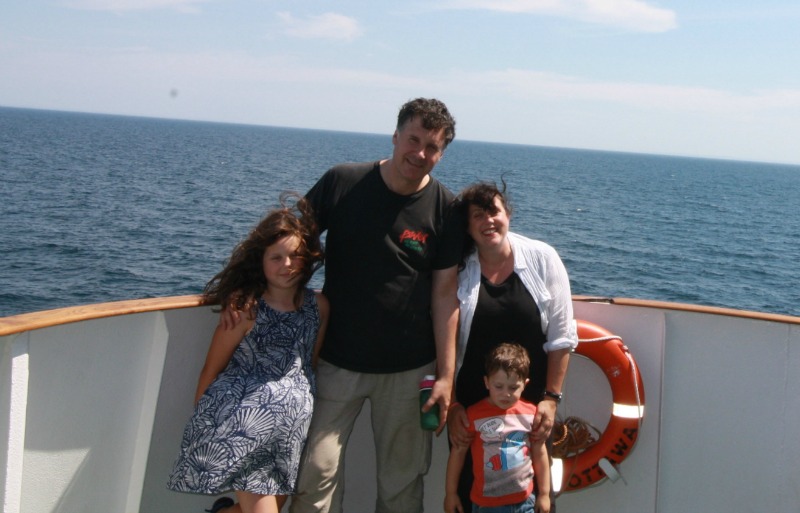
CMTA Ferry from Souris to Cap Aux Meules/ Photo: Helen Earley
Bubble Camping
Over five days, we stayed in three places: the upmarket Chateau Madelinot, the exciting all-inclusive resort La Salicorne, and finally, a fabulous former marine research station-turned youth hostel at Parc de Gros Cap.
The most unusual accommodation was “La Bulle” (the bubble) at La Salicorne, on the Island of Grande-Entrée. This weird and wonderful glamping experience was combined with an all-inclusive package at the resort which included a delicious cooked breakfast and a menu d’hôte (set menu) in the evenings.
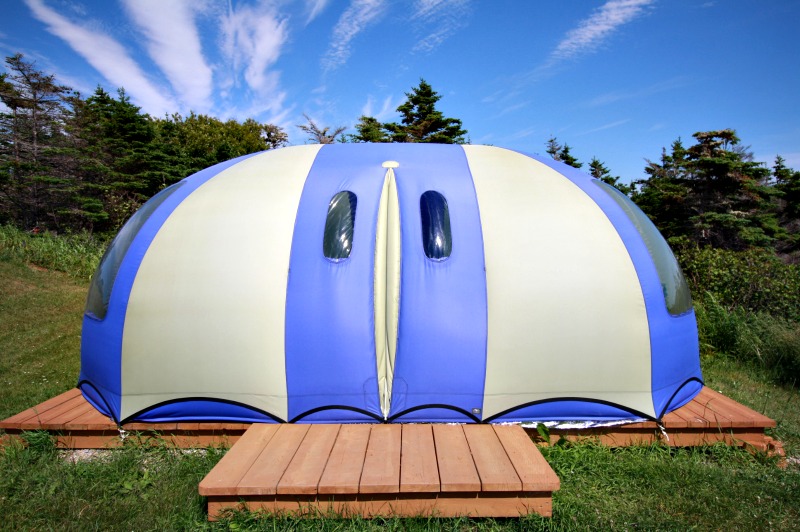
‘La Bulle’ at La Salicorne/ Photo: Helen Earley
Kayaking
La Salicorne offers a variety of nautical adventures for both guests and day visitors. For our family, the best option was to borrow from the fleet of user-friendly sit-on-top kayaks, moored in the calm, shallow waters of Bassin aux Huîtres (Oyster Bay), only a 5-minute walk through the woods from our bubble.
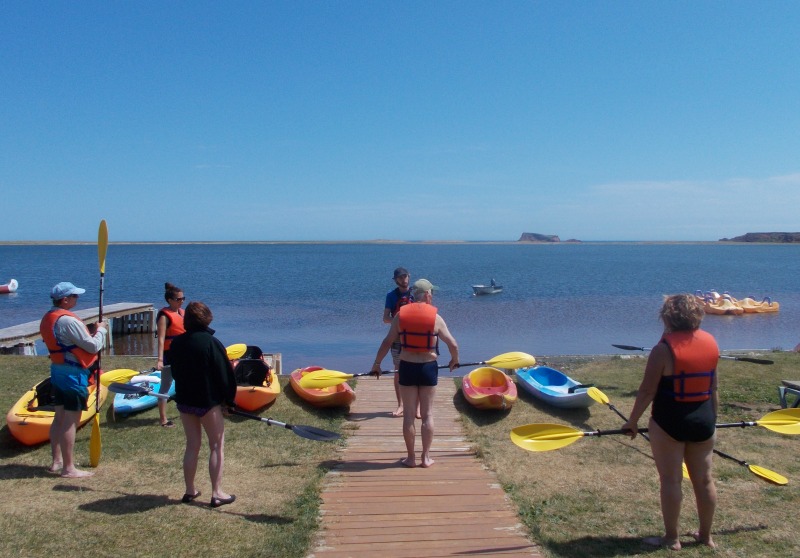
A Kayaking Tour at La Salicorne/ Photo: Helen Earley
One afternoon, my 7-year old daughter and I joined a small group of visitors (mainly from Montreal) on a guided mud-bathing tour. This was the perfect chance to practice our few words of French because nothing transcends the language barrier like rubbing red clay all over your body and asking someone to take your picture!
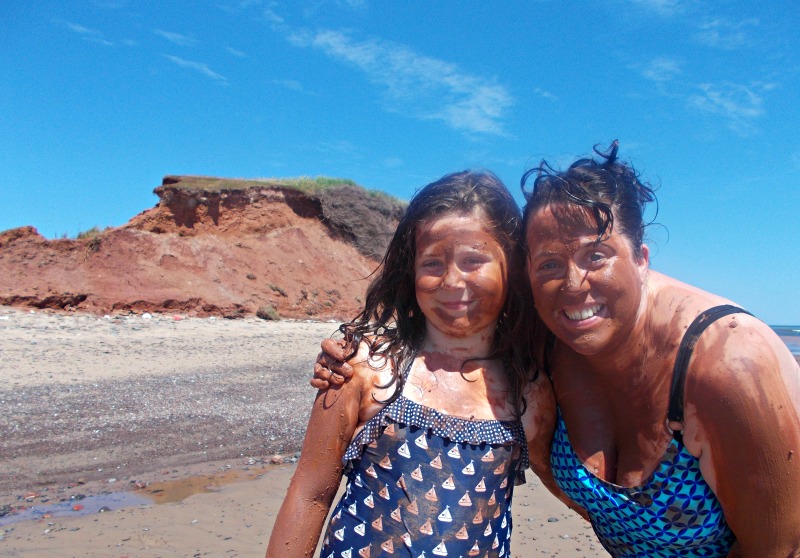
Nothing transcends the language barrier like smearing clay all over your body and asking someone to take your picture
Seal Interpretive Centre
That same evening, just before supper, we encountered a totally different kind of experience. One moment my kids were cuddling seal stuffies. The next, we’re receiving a fairly graphic description of how best to kill a seal (on the soft part of its head, apparently). Although it’s not for the ultra-squeamish, a visit to the Seal Interpretive Centre at La Salicorne helps visitors understand the seal trade as it exists today on the Islands.
Winter adventurists can return to the Islands in late February or early March to visit the harp seal birthing grounds through seal observation heli-tours arranged by the Chateau Madelinot, a luxury travel activity that is increasingly popular with tourists worldwide, especially the Chinese.
Hunting seals pups? This former practice (pups were valued for their white fur) has been banned since 1987. Hunting seals, generally, is restricted to locals, under strict regulations.
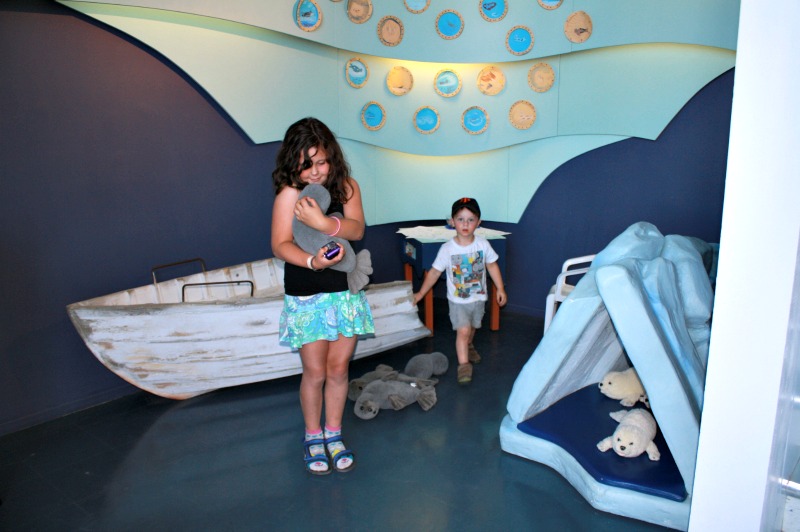
Seal Interpretive Centre at La Salicorne/ Photo: Helen Earley
Caving
Caving is one of the top draws for adventure travellers to the Magdalens. We didn’t actually do any caving on this trip because both kids are too young, but here’s a photo from the Magdalen Islands Tourism website of one of the most popular activities for adults and teenagers 14 years and older. We can’t wait to go back in a couple of years, and feel the power of the ocean as we explore the island’s geography from the water. My ebullient neighbour did it, and said it was an intense thrill!
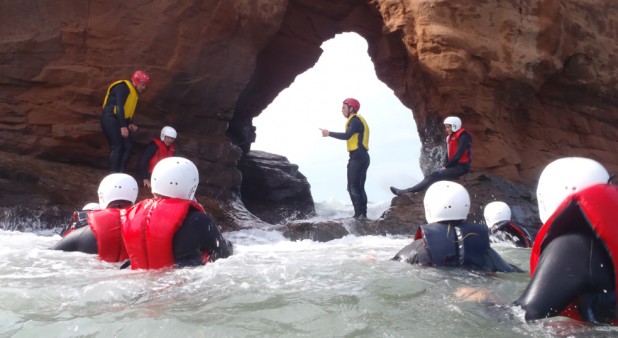
Caving: Photo courtesy of Isles de La Madeleine
Poutine and Pain au Chocolat
There’s plenty for the gourmet in the Magdalen Islands, but we kept things simple. One of our favourite family meals was a plate of poutine at the humble and spotless Restaurant Chez Armand, in the community of Fatima – more of a diner than a restaurant, but well worth the trip with hungry kids.
My taste buds also have extremely passionate memories of the best pain au chocolat I have ever had in my life, bought at Pâtisserie Hélène des Iles at Havre-Aux-Maisons. There, engulfed by the warm smell of chocolate baking, I had to blink to remind myself that I had not suddenly been transported to an arrondissement of Paris.
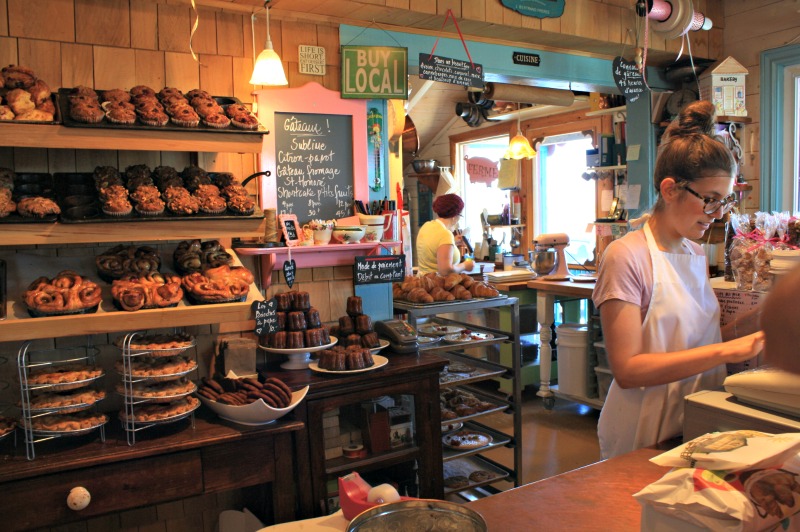
Pâtisserie Hélène des Iles: the world’s best pain au chocolat/Photo: Helen Earley
The Salt Museum
The Salt Mine Museum, just as you enter the municipality of Grosse-Île, is a small but mighty interpretative centre that sits above a maze of working salt mines, which primarily produce road salt for Quebec and Newfoundland. Young scientists and geologists will be boggled at the extent of the mines they are standing on top of, and by the history of salt, as explained in both English and French. For the very young, the museum has thoughtfully placed some toy trucks to play with. It’s a sweet – no wait, salty!- way to spend some time learning about the industry of the island.
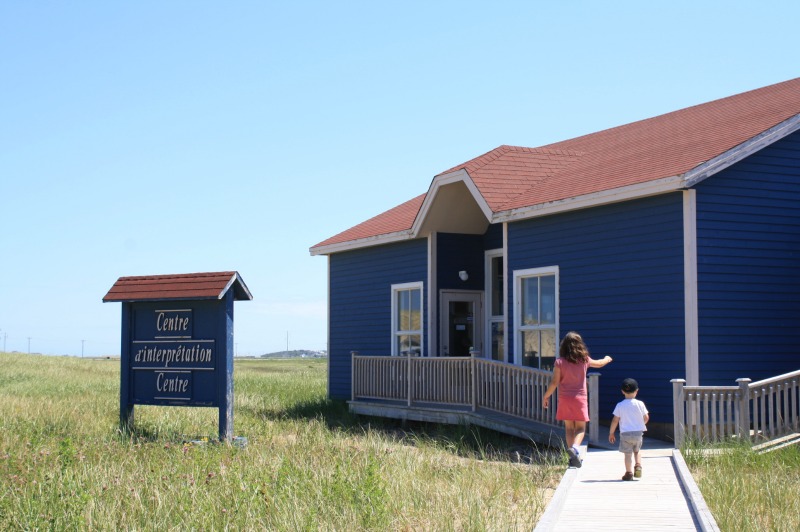
The Salt Museum at Grosse-Île/Photo: Helen Earley
Old Harry Beach
Grande Échouerie Beach, also known as Old Harry Beach is 14 miles of pristine white sand that squeaks beneath your feet, and cold, clear water which is beautiful for swimming. We visited old Harry twice during our stay: once for a lunchtime picnic, and again to spend the afternoon. Nearly everyone we met told us that the beach was once named as one of National Geographic’s best beaches Although I couldn’t find the reference, it is not hard to imagine Old Harry featured on the pages of National Geographic or Condé Nast Traveller.
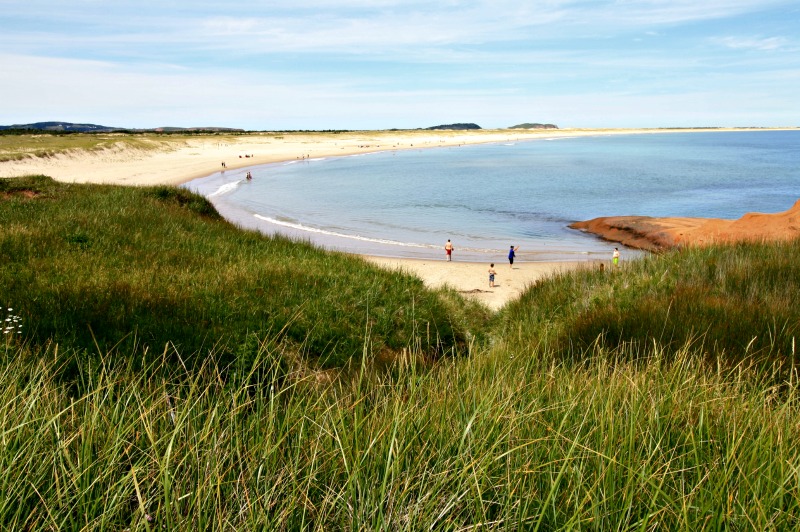
Spectacular Old Harry Beach/Photo: Helen Earley
Kite-making
The warm summer wind on the Magdalen Islands is a constant force: invigorating, rejuvenating – and perfect for flying kites! At La Boutique Au Gré du Vent on the island of L’Étang-du-Nord, you can choose from thousands of colourful kites to buy – or make your own, in a fun kite-making workshop. This is a superb activity for the whole family, with lots of other little workshops and boutiques to visit, while you wait for the wind to pick up (it won’t be long).
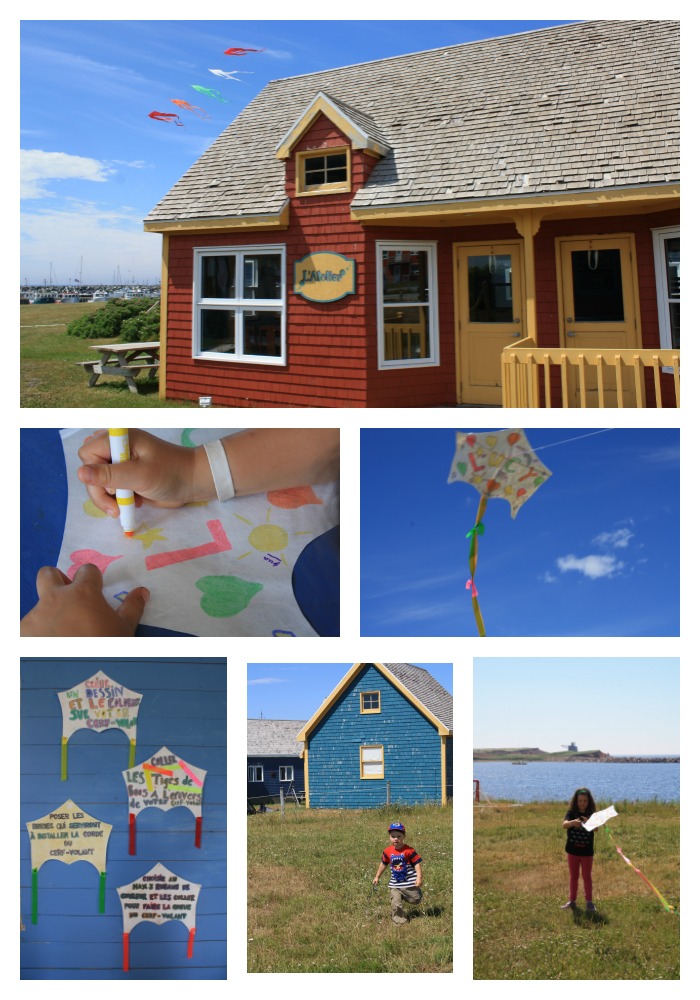
Kite-making at Boutique Au Gré du Vent on L’Étang-du-Nord/Photos: Helen Earley
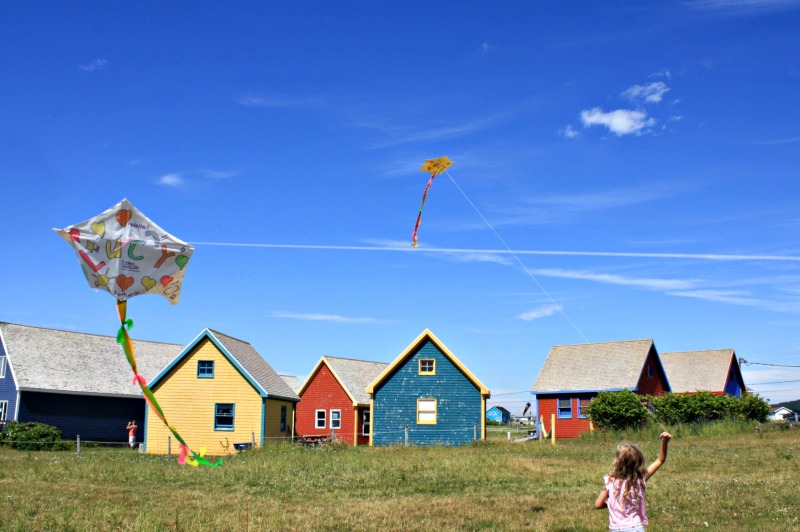
Wind guaranteed: flying kites on the Magdalen Islands is a great family activity/Photo: Helen Earley
Galerie-Boutique Le Flâneur
Just around the corner from kite central, the studio of Pierrette Molaison (artist’s name, Arthure) is situated in the basement of Le Flâneur tea shop and boutique. Her collection of Spécemins Madeleines: local businesspeople, sea captains, fishermen and entrepreneurs, immortalised as dolls or paintings (sometimes both), offers a profound, personal insight into the life and culture of the islanders.
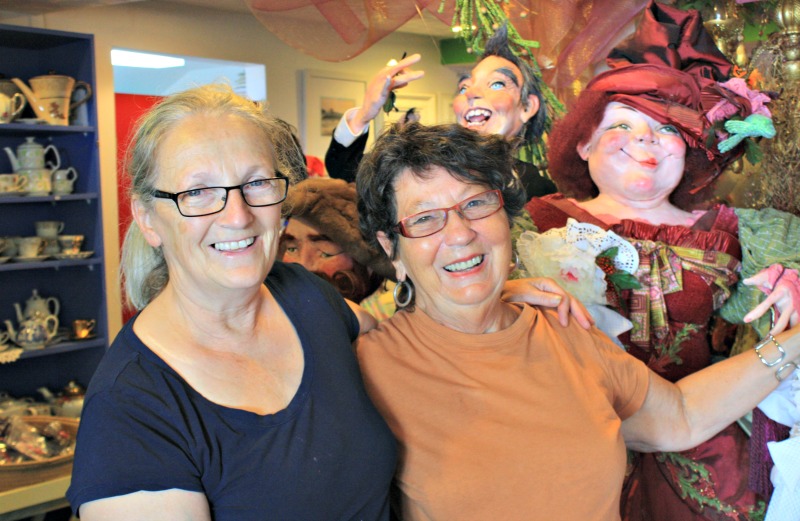
Pierrette Molaison and Nicole Garneau welcome you to Le Flâneur: a tea shop and boutique that is full of surprises./Photo: Helen Earley
When I asked Molaison whether it was considered an honour to be made into one of Arthure’s “personnages”, a local customer who had overheard us talking, interjected emphatically: “Moi, Je confirme que oui!” Yes!

Hidden treasures in the basement gallery at Le Flâneur/Photo: Helen Earley
In her collection of over 2,000 dolls, Molaison also deals in fantasy. In the enchanting outdoor garden of Le Flâneur, my three-year son was entranced by La Maison Croche des Dame Courgettes (The Crooked House of the Pumpkin-ladies), a wonky, wooden house that prohibits adults, but invites brave children to enter and take a candy from a jar. For a toddler, a thrilling fairy tale experience, “La Maison Croche” reflects the wit, creativity and generous spirit of Les Madelinots.
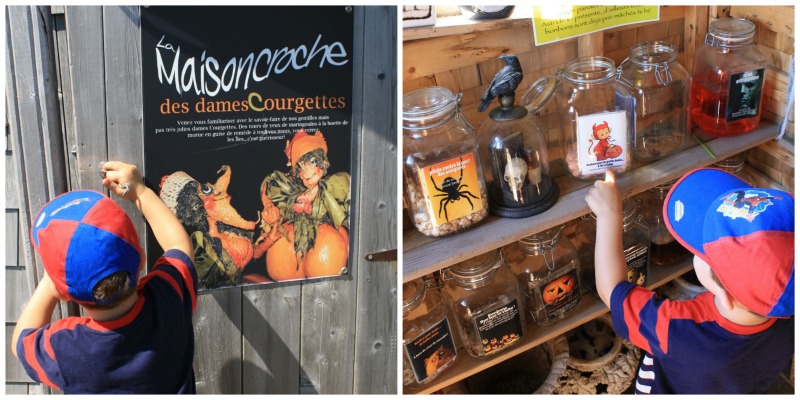
In the garden of Le Flâneur, La Maison Croche offers children a thrilling treat/Photos: Helen Earley
Sandcastles
In the popular tourist area of La Grave, on Havre-Aubert Island (this is where you will also find some of those hip restaurants and bars) I recommend the Artisans du Sable as a great place to buy some really classy souvenirs.
The gallery also has a fascinating display of hundreds of tiny vials of sand from all over the world, from Robben Island, South Africa to Chéticamp, Cape Breton. Like many experiences on the islands, this unassuming exhibit is humbling and spiritually grounding.
Outside the gallery is a large sandbox, where on Mondays during high season, a local sand artisan crafts a unique sand sculpture. Not one to be grounded by anything, my 3-year old son arrived at the sandbox just after the sand artisan had left. I’ll let you guess what happened next!
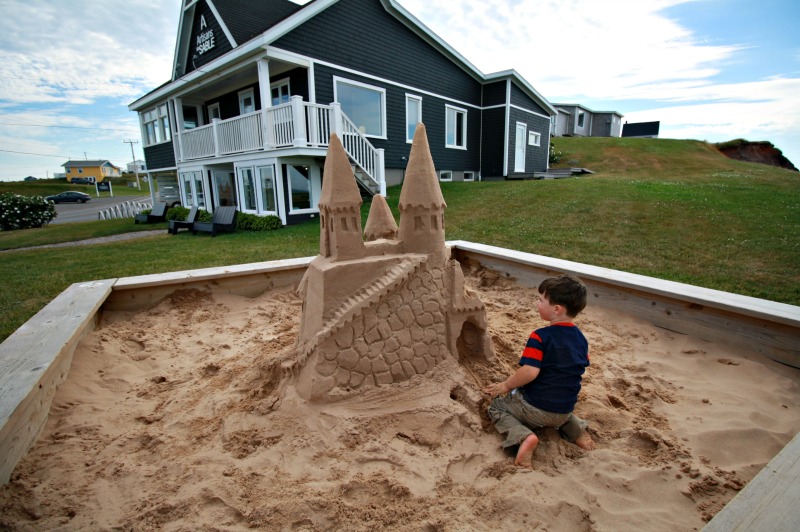
Les Artisans du Sable/Photo: Helen Earley
And so, revitalised, educated, well-fed and invigorated, our family returned to Halifax with holiday memories entirely different from those of a honeymooning couple, but equally as dear. And, just like my gushing neighbour, we find ourselves recommending a family road trip through the Magdalens to almost everyone we meet.
More often than not, the response is something like, “Oh, I have always wanted to go there”… but no one really explains why they haven’t yet been.
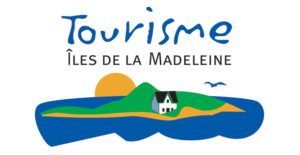
Helen Earley is a Halifax-based writer. She and her family were hosted by Tourisme Iles de La Madeleine.



